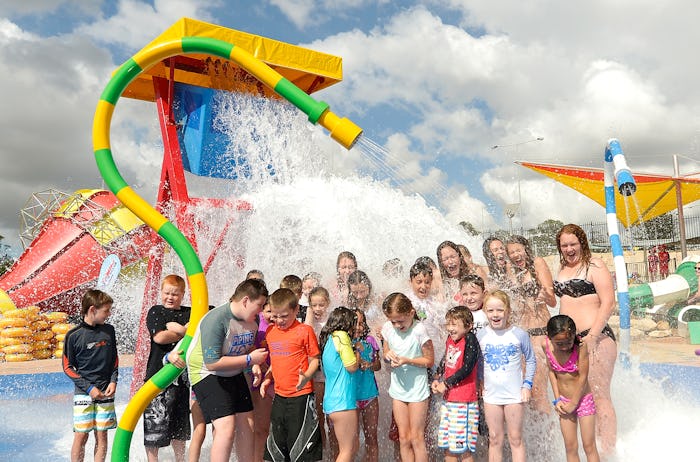Life

Here Are 4 Ways Going To The Water Park Can Affect Your Kid's Brain For The Better
Water parks are amazing places: They can give you thrills one minute and mellow moments the next. You can enjoy them any time of year: outdoor parks in the summer, and indoor parks in cold or rainy weather. What you may not know is that water parks affect your child's brain in a variety of surprising ways. Yes, all that splashing, tubing, and sliding actually make for a valuable learning experience (which might make it seem a little less painful to shell out money for those pricey tickets).
Romper spoke with Laura Phillips, PsyD, ABPdN, a board-certified clinical neuropsychologist in the Learning and Development Center at the Child Mind Institute in New York. She explains that going to a waterpark (think: Walt Disney World's Blizzard Beach, or the Great Wolf Lodge chain of indoor water resorts) provides a different developmental experience from the one you get at the county fair or your average dry-land theme park.
"Water provides a different sensory experience than other forms of play, such as playing with blocks," says Dr. Phillips. "It stimulates kids in an auditory, tactile, visual, olfactory, and even gustatory way — and provides a new experience for them."
Renee McGuirk, an early childhood educator in the toddler room at Progress Child Care Centre of Centennial College in Toronto, told Today's Parent that toddlers in particular can benefit from this type of tactile play: “They like to explore with all their senses and they enjoy all kind of sensory activities — water play is one of these. It’s a combination of learning and enjoyment.”
Here's what Dr. Phillips and other experts have to say about the brain-boosting benefits of visiting water parks. These perks more than make up for having to deal with damp bathing suits, long lines at the slides, and the lingering smell of chlorine.
1Water parks heighten their senses.
The unfamiliar environment, the colors, the textures, the different ways to interact with water — the whole water park experience is a sensory wonderland that stimulates a child's brain in positive ways. "In infancy, toddlerhood, and even the early preschool years, development is dominated by sensorimotor advances," says Dr. Phillips. "They develop an understanding of the world around them through sensory experiences, and the more diverse their sensory experiences are, the more they learn."
In other words, playing in the bath and stomping in rain puddles are great for kids. But add to that the noise, atmosphere, and variety of experiences that a waterpark provides, and your child's mind expands and wonders ten times more quickly.
2Water parks build kids' problem-solving skills.
You probably associate the term "problem-solving" with puzzles or exams. Surprise — children learn how to solve problems in ways that don't involve paper and pencils. "Through exploring the environment and stimulating the senses, children are sending signals to their brains that will help strengthen their ability to discover, identify, classify, and sort, which are critical foundations for later learning and problem-solving," explains Dr. Phillips. "A water park offers new sensory experiences: For example, the type of tactile stimulation they encounter allows them to learn about properties, such as texture, temperature, wet versus dry, etc. Auditory stimulation includes the sound of water splashing, the motors on water rides, adult and children’s voices, etc., which again increases their ability to identify, classify, and discriminate." In other words, simply sorting out the sensory extravaganza at a waterpark gives a child's brain a hefty workout.
3Water parks help children's physical development.
Riding on the slides, boogie boards, and inner tubes at water theme parks are more than just fun — they help children build vital physical skills. Activities like these boost the development of the vestibular system, a sense of where we are in relation to the space around us, explained Mountain Kids. Rocking back and forth, spinning, and sliding all send messages to a child's inner ear about their position and location. The messages are then sent to the brain for processing, and the child's body responds by changing position or balancing. Trying to stay upright in the water adds an extra challenge to the vestibular system. The result: better coordination, posture, and muscle control.
4Water parks build literacy skills.
Dr. Phillips points out that water parks can be intellectually as well as physically stimulating for children. "Water parks provide a lot of fodder for conversation, which helps to foster language development, strengthen interpersonal connections, and increase self-awareness," she says. "Talk to your children about the park — what did they like best and why? What did they like least and why? In addition to providing practice for organizing one’s thoughts and ideas into oral language, such questions help kids learn how to think critically and evaluate different things."
5
With all this in mind, why not plan a waterpark visit before the summer officially ends (or go to an indoor one for a winter treat)? You can tell your friends, "Oh, we're not just going for the fun of it — the kids are going to come back stronger and smarter!"